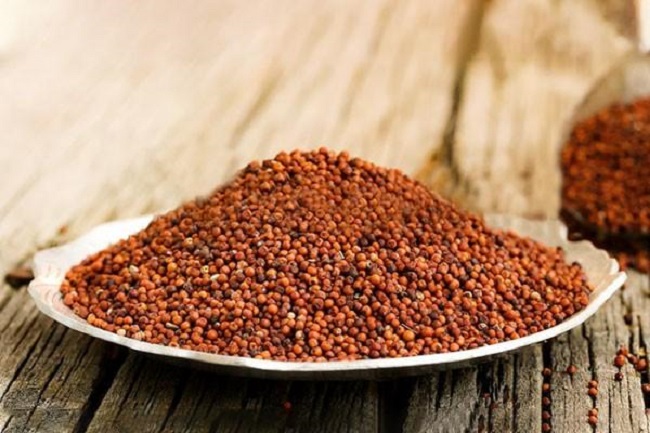Hypertension, which accounts for approximately 90 percent of people with high blood pressure, occurs without a clear cause, and it is treated using medications along with dietary and lifestyle modifications.
Antihypertensive drugs, such as thiazide diuretics, calcium channel blockers, and angiotensin-converting enzyme inhibitors, exhibit therapeutic benefits for clinical use. However, these drugs show signs of side effects such as angioedema (painless swelling under the skin) and cough, thus reducing adherence to prescribed doses and increasing the severity of hypertension and the cost of treatment.
Interest in exploring natural bioactive substances as alternative approaches for managing hypertension has increased. Now, experts in a new study suggest that sorghum, adzuki bean (Vigna angularis or red beans), and finger millet can be used as dietary supplements for blood pressure regulation and cardiovascular disease prevention.
The study, in the 2024 Scientific Reports, investigated the blood pressure-lowering and heart-protective effects of the combined extract of sorghum, adzuki bean, and finger millet (SAFE) on spontaneously hypertensive rats. It was prepared by mixing equal amounts of sorghum, adzuki beans, and finger millet.
SAFE, a mineral-rich multigrain extract, significantly decreased the lean-to-fat mass ratio with no notable changes in body weight, food intake, or food efficiency ratio, and it effectively lowered both systolic (the top number) and diastolic (the bottom number) blood pressures.
In the final week of the experiment, the SAFE group had a significantly lower systolic blood pressure (SBP) by 20 percent than the spontaneously hypertensive rats (SHR) group. The diastolic blood pressure (DBP) results were consistent with the SBP results, which showed a blood-lowering effect of SAFE over a six-week period.
Moreover, it significantly reduced the cardiac mass index and alleviated cardiac fibrosis. Also, it did not induce liver damage at an administered dose of 500 mg/kg body weight, confirming its safety. Hypertension can induce liver damage.
Cardiac hypertrophy and fibrosis are common consequences of hypertension. Prolonged high blood pressure increases the heart workload, leading to the heart muscles becoming large and thick.
Cardiac hypertrophy and fibrosis are early indicators of heart disease progression that ultimately lead to heart failure, myocardial infarction, and other cardiovascular diseases. Therefore, cardiac hypertrophy and fibrosis alleviation are necessary to treat hypertensive complications.
The researchers said that although no previous studies have investigated the effects of SAFE on functions of the heart, their phytochemical components have demonstrated the potential to promote heart health.
Grains and legumes, prominently used in traditional medicine, are functional food ingredients. Previous studies have demonstrated the blood pressure-lowering effects of finger millet and adzuki bean extracts.
Sorghum is abundant in potassium and phosphorus; adzuki beans are rich in magnesium, folate, and potassium; and finger millet is the only grain with a calcium content more than three times that of milk.
Adzuki beans, also called azuki or aduki, come in a range of colours, but red adzuki beans are the most well-known.
Adzuki beans are linked to several health benefits, ranging from heart health and weight loss to improved digestion and a lower risk of diabetes.
Test-tube and animal studies link adzuki bean extracts to lower blood pressure, as well as lower triglyceride, total, and “bad” LDL cholesterol levels, and less fat accumulation in the liver.
Human studies also consistently associate regular consumption of legumes with lower cholesterol levels and a reduced risk of heart disease.
In one small study, women given adzuki bean juice for one menstrual cycle reduced their blood triglycerides by 15.4 to 17.9 percent, compared to increased levels in the control group.
Hypertension, often called a “silent killer,” is a leading cause of mortality and a major health concern worldwide. Although no obvious symptoms are observed in the early stages, if not properly treated and managed, hypertension can lead to stroke, kidney disease, heart failure, and death from cardiovascular disease, posing a substantial socioeconomic burden on the affected patients.
Although the exact mechanism of the blood pressure-lowering effect of SAFE is unclear, the researchers suggested that the ACE inhibitory and antioxidant activities of SAFE may be involved.
“Therefore, the observed reduction in SBP and DBP following SAFE administration suggests its potential to attenuate hypertension,” they added.
According to them, the observed decrease in cardiac mass index and improvement in fibrosis imply that this may be related to the heart-protective properties of phenolic compounds, even if the precise chemicals in SAFE have not yet been identified.
As a result, they recommended more research to pinpoint the precise active ingredients in SAFE and clarify the processes underlying its antihypertensive benefits.
Africa is home to an abundant variety of vegetables with vital nutrients that could help in hypertension management. This includes okra, spinach, African eggplant, bitter leaf, water leaf, and pumpkin leaf. These vegetables are helpful in hypertension management as they contain nutrients like fibre and antioxidants while being low in sodium.
